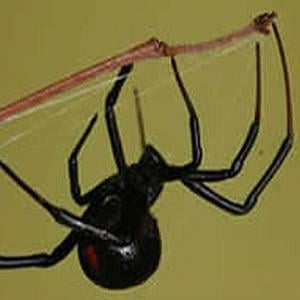
Spiders have no particular interest in biting us. But sometimes, if they think we’re threatening them (e.g. they’re being sat on), they will. And if the spider that feels itself under threat happens to be a black button spider, you could be in trouble
Spider venom is either neurotoxic or cytotoxic. Neurotoxic venom affects the central nervous system, while cytotoxic venom affects the tissue around the bite.
In Southern Africa, the neurotoxic spiders to recognise are the button spiders.
Button spiders (genus Lactrodectus) are so named because they have round abdomens. There are several species of buttons, which can be divided into two groups: black and brown button. This distinction is useful because a black spider bite is more serious than one from its brown cousins. The following table shows how you can tell them apart:
| Black button spiders | Brown button spiders | |
| How venomous | Highly venomous | Less venomous |
| Colour and markings | Dark brown to black, red markings on dorsal (upper) abdomen. No ventral (underside) markings. | Cream, grey, brown or black. Ventral abdomen has red or orange hour-glass marking. |
| Bite | Bite usually very painful. Other possible symptoms: muscle cramps and pain, stiff stomach muscles, limb pain, leg weakness, sweating, raised blood pressure, restlessness. | Burning pain at bite site and may spread to surrounding area. Bite site may be red, or pale area surrounded by rash. Usually resolves within 48 hrs. |
Button spiders are also sometimes called widow spiders, and it is by the later name that similar species are more commonly known in Europe and North America. Note: in these two continents, two highly venomous species have the hourglass marking, while in Southern Africa two less venomous species have it (as described in the table above).
Despite the stats i.e. that your chances of dying of a spider bite are miniscule, these bites can lead to nasty complications, and should be considered especially dangerous to children, the elderly and the chronically ill. Also, there is always the possibility that someone might turn out to be particularly sensitive to spider venom, and have an unusually bad reaction to it.
If you suspect someone has been bitten by a black button spider, or if any spider bite seems to be getting worse or is associated with systemic (i.e. generalised) symptoms, get medical help immediately. If the person bitten falls into one of the vulnerable groups mentioned above, even if they don’t seem to have worrying symptoms, it’s a good idea to consult a doctor just in case.
A person who has been bitten by a black button spider needs to be hospitalised and treated with anti-venom.
- Olivia Rose-Innes, EnviroHealth Expert, Health24, June 2006
Information sources:
Dippenaar-Schoeman, A. S. and Muller, G. 2000. Medically important spiders and scorpions of southern Africa.




 Publications
Publications
 Partners
Partners













